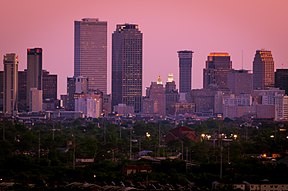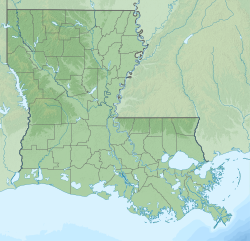
Back New Orleans Afrikaans New Orleans ALS ኑ ኦርሌንዝ Amharic Nueva Orleans AN Niwēorlēanas ANG نيو أورلينز Arabic نيو اورلينز ARZ Nueva Orleans AST Nyu-Orlean Azerbaijani نیو اورلئان AZB
New Orleans
La Nouvelle-Orléans (French) Nouvèl Orleans (Louisiana Creole) | |
|---|---|
| Nicknames: "The Crescent City", "The Big Easy", "The City That Care Forgot", "NOLA", "The City of Yes", "Hollywood South", "The Creole City" | |
 Interactive map of New Orleans | |
| Coordinates: 29°58′34″N 90°4′42″W / 29.97611°N 90.07833°W | |
| Country | United States |
| State | Louisiana |
| Parish | Orleans (coterminous) |
| Founded | 1718 |
| Founded by | Jean-Baptiste Le Moyne de Bienville |
| Named for | Philippe II, Duke of Orléans (1674–1723) |
| Government | |
| • Type | Mayor–council |
| • Mayor | LaToya Cantrell (D) |
| • Council | New Orleans City Council |
| Area | |
| 349.85 sq mi (906.10 km2) | |
| • Land | 169.42 sq mi (438.80 km2) |
| • Water | 180.43 sq mi (467.30 km2) |
| • Metro | 3,755.2 sq mi (9,726.6 km2) |
| Elevation | −6.5 to 20 ft (−2 to 6 m) |
| Population | |
| 383,997 | |
| • Density | 2,267/sq mi (875/km2) |
| • Urban | 963,212 (US: 49th) |
| • Urban density | 3,563.8/sq mi (1,376.0/km2) |
| • Metro | 1,270,530 (US: 45th) |
| Demonym | New Orleanian |
| GDP | |
| • Consolidated city-parish | $29.482 billion (2023) |
| • Metro | $102.437 billion (2023) |
| Time zone | UTC−6 (CST) |
| • Summer (DST) | UTC−5 (CDT) |
| Area code | 504 |
| FIPS code | 22-55000 |
| GNIS feature ID | 1629985 |
| Website | nola |
New Orleans[a] (commonly known as NOLA or The Big Easy among other nicknames) is a consolidated city-parish located along the Mississippi River in the southeastern region of the U.S. state of Louisiana. With a population of 383,997 according to the 2020 U.S. census,[8] it is the most populous city in Louisiana and the French Louisiana region;[9] the third-most populous city in the Deep South; and the twelfth-most populous city in the Southeastern United States. Serving as a major port, New Orleans is considered an economic and commercial hub for the broader Gulf Coast region of the United States.
New Orleans is world-renowned for its distinctive music, Creole cuisine, unique dialects, and its annual celebrations and festivals, most notably Mardi Gras. The historic heart of the city is the French Quarter, known for its French and Spanish Creole architecture and vibrant nightlife along Bourbon Street. The city has been described as the "most unique" in the United States,[10][11][12][13] owing in large part to its cross-cultural and multilingual heritage.[14] Additionally, New Orleans has increasingly been known as "Hollywood South" due to its prominent role in the film industry and in pop culture.[15][16]
Founded in 1718 by French colonists, New Orleans was once the territorial capital of French Louisiana before becoming part of the United States in the Louisiana Purchase of 1803. New Orleans in 1840 was the third most populous city in the United States,[17] and it was the largest city in the American South from the Antebellum era until after World War II. The city has historically been very vulnerable to flooding, due to its high rainfall, low lying elevation, poor natural drainage, and proximity to multiple bodies of water. State and federal authorities have installed a complex system of levees and drainage pumps in an effort to protect the city.[18][19]
New Orleans was severely affected by Hurricane Katrina in late August 2005, which flooded more than 80% of the city, killed more than 1,800 people, and displaced thousands of residents, causing a population decline of over 50%.[20] Since Katrina, major redevelopment efforts have led to a rebound in the city's population. Concerns have been expressed about gentrification, new residents buying property in formerly close-knit communities, and displacement of longtime residents.[21][22][23][24] Additionally, high rates of violent crime continue to plague the city with New Orleans experiencing 280 murders in 2022, resulting in the highest per capita homicide rate in the United States.[25][26]
The city and Orleans Parish (French: paroisse d'Orléans) are coterminous.[27] As of 2017, Orleans Parish is the third most populous parish in Louisiana, behind East Baton Rouge Parish and neighboring Jefferson Parish.[28] The city and parish are bounded by St. Tammany Parish and Lake Pontchartrain to the north, St. Bernard Parish and Lake Borgne to the east, Plaquemines Parish to the south, and Jefferson Parish to the south and west. The city anchors the larger Greater New Orleans metropolitan area, which had a population of 1,271,845 in 2020.[29] Greater New Orleans is the most populous metropolitan statistical area (MSA) in Louisiana and, since the 2020 census, has been the 46th most populous MSA in the United States.[30]
- ^ "2016 U.S. Gazetteer Files". United States Census Bureau. Archived from the original on April 25, 2018. Retrieved July 2, 2017.
- ^ "U.S. Population Totals 2010–2020". United States Census Bureau. Archived from the original on August 29, 2021. Retrieved August 12, 2021.
- ^ "List of 2020 Census Urban Areas". United States Census Bureau. Archived from the original on January 14, 2023. Retrieved July 22, 2023.
- ^ "Total Gross Domestic Product for New Orleans-Metairie, LA (MSA)". fred.stlouisfed.org. Archived from the original on January 4, 2024. Retrieved January 4, 2024.
- ^ "Gross Domestic Product: All Industries in Orleans Parish, LA". fred.stlouisfed.org. December 18, 2023.
- ^ New Orleans Archived March 6, 2018, at the Wayback Machine. Merriam-Webster.
- ^ Romer, Megan. "How to Say 'New Orleans' Correctly". About Travel. about.com. Archived from the original on October 16, 2015. Retrieved January 31, 2015.
- ^ "QuickFacts: New Orleans city, Louisiana". United States Census Bureau. August 10, 2021. Archived from the original on August 29, 2021. Retrieved August 12, 2021.
- ^ Henry Louis Mencken (1924). The American Language: An Inquiry Into the Development of English in the United States. A. A. Knopf. p. 412.
- ^ Institute of New Orleans History and Culture Archived December 7, 2006, at the Wayback Machine at Gwynedd-Mercy College
- ^ "Hurricane on the Bayou – A MacGillivray Freeman Film". Hurricane on the Bayou. Archived from the original on January 15, 2016.
- ^ David Billings, "New Orleans: A Choice Between Destruction and Reparations", The Fellowship of Reconciliation, November/December 2005
- ^ Damian Dovarganes, Associated Press, "Spike Lee offers his take on Hurricane Katrina" Archived September 17, 2022, at the Wayback Machine, MSNBC, July 14, 2006
- ^ "The Founding French Fathers". Archived from the original on April 12, 2008. Retrieved April 26, 2008.
- ^ "Hollywood South: Why New Orleans Is the New Movie-Making Capital". ABC News. Archived from the original on September 17, 2022. Retrieved October 28, 2020.
- ^ "Hollywood South: Film Production and Movie Going in New Orleans". New Orleans Historical. Archived from the original on September 17, 2022. Retrieved October 28, 2020.
- ^ "Population of the 100 Largest Urban Places: 1840". United States Census Bureau. 1998. Archived from the original on February 14, 2018. Retrieved July 7, 2018.
- ^ "About the Orleans Levee District". Orleans Levee. Archived from the original on June 25, 2018. Retrieved July 7, 2018.
- ^ Jervis, Rick. "Fifteen years and $15 billion since Katrina, New Orleans is more prepared for a major hurricane – for now". USA TODAY. Archived from the original on September 17, 2022. Retrieved July 16, 2021.
- ^ "Report: New Orleans Three Years After the Storm: The Second Kaiser Post-Katrina Survey, 2008". The Henry J. Kaiser Family Foundation. August 1, 2008. Archived from the original on July 7, 2018. Retrieved July 7, 2018.
- ^ "Is Post-Katrina Gentrification Saving New Orleans Or Ruining It?". BuzzFeed. Archived from the original on September 2, 2017. Retrieved July 7, 2018.
- ^ Elie, Lolis (August 27, 2019). "Opinion | Gentrification Might Kill New Orleans Before Climate Change Does". The New York Times. ISSN 0362-4331. Archived from the original on September 27, 2022. Retrieved July 29, 2021.
- ^ "Gentrification a Growing Threat for Many New Orleans Residents". Louisiana Fair Housing Action Center. Archived from the original on September 14, 2021. Retrieved July 29, 2021.
- ^ Kinniburgh, Colin (August 9, 2017). "How to Stop Gentrification". The New Republic. ISSN 0028-6583. Archived from the original on September 17, 2022. Retrieved July 29, 2021.
- ^ Schirm, Cassie (January 4, 2023). "'It has been a horrific year': New Orleans' 2022 was a violent year, what analysts say we can learn from it for 2023". WDSU. Archived from the original on January 21, 2023. Retrieved August 20, 2023.
- ^ Robin, Natasha (September 19, 2022). "New Orleans tops the nation for homicides per capita". www.fox8live.com. Archived from the original on August 20, 2023. Retrieved August 20, 2023.
- ^ "Orleans Parish History and Information". Archived from the original on May 15, 2005. Retrieved March 18, 2008.
- ^ "Quick Facts – Louisiana Population Estimates". US Department of Commerce. Archived from the original on January 10, 2024. Retrieved January 6, 2017.
- ^ "2020 Population and Housing State Data". The United States Census Bureau. Archived from the original on August 24, 2021. Retrieved August 18, 2021.
- ^ "U.S. Census website". United States Census Bureau. Archived from the original on December 27, 1996. Retrieved July 7, 2018.
Cite error: There are <ref group=lower-alpha> tags or {{efn}} templates on this page, but the references will not show without a {{reflist|group=lower-alpha}} template or {{notelist}} template (see the help page).











